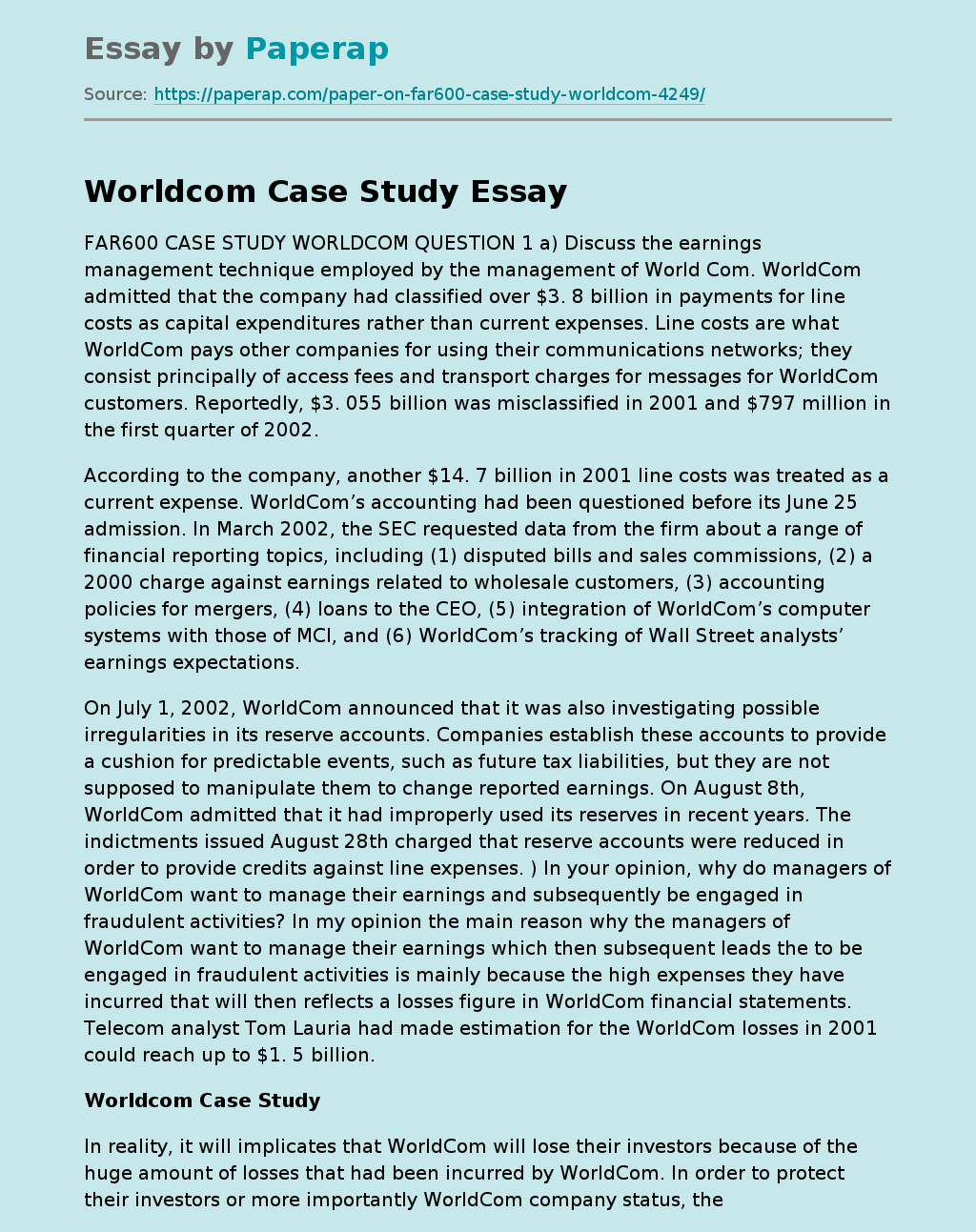Worldcom Case Study
According to the company, another $14. 7 billion in 2001 line costs was treated as a current expense. WorldCom’s accounting had been questioned before its June 25 admission. In March 2002, the SEC requested data from the firm about a range of financial reporting topics, including
- disputed bills and sales commissions,
- a 2000 charge against earnings related to wholesale customers,
- accounting policies for mergers,
- loans to the CEO,
- integration of WorldCom’s computer systems with those of MCI, and
- WorldCom’s tracking of Wall Street analysts’ earnings expectations.
On July 1, 2002, WorldCom announced that it was also investigating possible irregularities in its reserve accounts. Companies establish these accounts to provide a cushion for predictable events, such as future tax liabilities, but they are not supposed to manipulate them to change reported earnings. On August 8th, WorldCom admitted that it had improperly used its reserves in recent years. The indictments issued August 28th charged that reserve accounts were reduced in order to provide credits against line expenses.
) In your opinion, why do managers of WorldCom want to manage their earnings and subsequently be engaged in fraudulent activities? In my opinion the main reason why the managers of WorldCom want to manage their earnings which then subsequent leads the to be engaged in fraudulent activities is mainly because the high expenses they have incurred that will then reflects a losses figure in WorldCom financial statements. Telecom analyst Tom Lauria had made estimation for the WorldCom losses in 2001 could reach up to $1. 5 billion.
In reality, it will implicates that WorldCom will lose their investors because of the huge amount of losses that had been incurred by WorldCom.
In order to protect their investors or more importantly WorldCom company status, the managers decided to make an accounting moves that can reduced their expenses. This had been stated by the internal audit of WorldCom which indicates that they uncovered misdeeds that there were no accounting standards to support the expenses. It had been noted that WorldCom had inexplicably reduced one of WorldCom’s unit expenses by $33. million dollars and leads to a higher profit margin in WorldCom financial statements. Another reason that can be noted regarding why WorldCom want to manage their earnings which then leads to in fraudulent activities is because WorldCom wanted to make a tax evasion. This can been proved at Tyco International by the action of both CFO Mark Swartz and ousted CEO Dennis Kozlowski reportedly signed off on each of the scores of deals Tyco made since 1999. Main reason of the signed off on each of the scores is for tax evasion or to reduce the amount of tax to be paid to the IRR’s.
Other than that both CFO Mark Swartz and ousted CEO Dennis Kozlowski used the earnings management to use the Tyco International money for their personal expenses. This issue had been provided by the evidence made by USA TODAY’s which had been published in their articles. Other reason why the managers of WorldCom want to manage their earnings which then subsequent leads to the engaged in fraudulent activities are the peer pressure made by the higher authority to increase WorldCom’s division profit margin.
This issue had been posted in an article regarding an e-mail dated march5, 2001 which stated that Myers trefers to recent diner in which Sullivan and executives Tom Bosley discussed the need to “do whatever necessary to get Telco margins back in line”. It shows that the higher authority are pressuring their stuff to increase their profit margin which are currently declining at any means whether its uses appropriate accounting standards or not. c) What were the consequences that befell the company upon the discovery of the fraudulent activities?
WorldCom stock had fallen from a high of $64. 50 a share in mid-1999 to less than $2 a share. The price fell below $1 a share immediately after the announcement and then to pennies a share upon news that there might be further accounting irregularities. While much and perhaps most of this decline might be attributed to the firm’s changing economic prospects, the accounting maneuver described above is likely to have hurt investors who continued to hold the shares or even bought more in anticipation of a rebound.
WorldCom employees who hold the company’s stock in their retirement plans have also suffered losses. At the end of 2000, about 32%, or $642. 3 million, of WorldCom retirement funds were in company stock; those investment have fallen to less than 4%, or less than $18. 7 million, of the funds. WorldCom does not require employees to own company stock in their retirement plans, and they are permitted to sell the shares they do have.
Worldcom Case Study. (2019, Dec 05). Retrieved from https://paperap.com/paper-on-far600-case-study-worldcom-4249/

